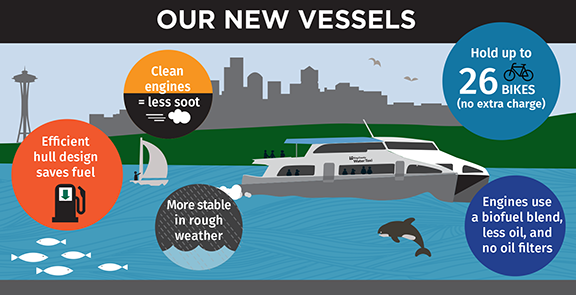King County’s water taxis going green with use of biodiesel fuel
King County Water Taxis are switching to Bio Diesel fuel which has earned them the the 'Green Waters' distinction.
Tue, 09/15/2015
information from King County
What could be better than commuting across Puget Sound in a water taxi and bypassing all that traffic? Now there’s yet another reason to appreciate the ride - in addition to fighting congestion, these King County water taxis are doing their part to combat greenhouse gas emissions by switching to the use of biodiesel fuel.
“Using homegrown biodiesel, our water taxis have some of the cleanest-burning engines around,” said King County Executive Dow Constantine. “The use of biodiesel on the newest member of our fleet, the Sally Fox, will reduce particulates in the air and prevent more than 140 metric tons of carbon dioxide emissions every year.”
In line with the biodiesel initiative, the County’s Marine Division has earned membership in the Passenger Vessel Association’s Green WATERS Program – a national volunteer effort that encourages environmental responsibility and action to reduce the environmental impacts of marine operations.
The Sally Fox, soon to be joined by a second new vessel, the Doc Maynard, has a host of green features that include:
· Operating on a locally-sourced 10 percent biodiesel blend, which reduces our dependence on fossil fuel.
· Engines that operate more cleanly and emit less particulate matter.
· The addition of high-efficiency heating systems, LED lights, and recycling stations to help reduce waste.
· Expanded capacity for bicycles. The new vessels can accommodate 26 bicycles on every trip.
When the County’s third vessel, The Spirit of Kingston, has its annual maintenance this fall, fuel tanks will be cleaned readying the vessel to burn biodiesel.
King County’s water taxi fleet joins other regional marine systems, including Washington State Ferries, in operating some of the cleanest vessels in the nation. They also support Executive Constantine’s recently released climate action plan that provides a five-year blueprint that will guide county’s actions to confront climate change.
The county’s water taxi fleet is expected to deliver nearly 500,000 boardings by the end of 2015.


